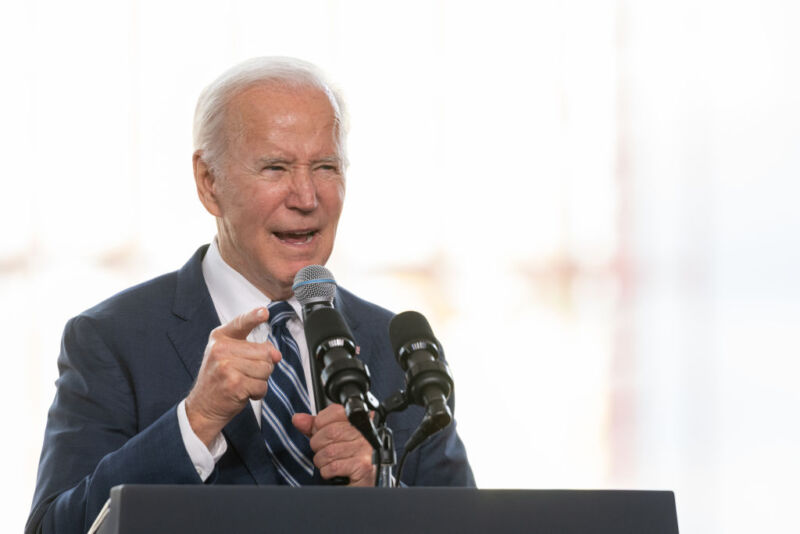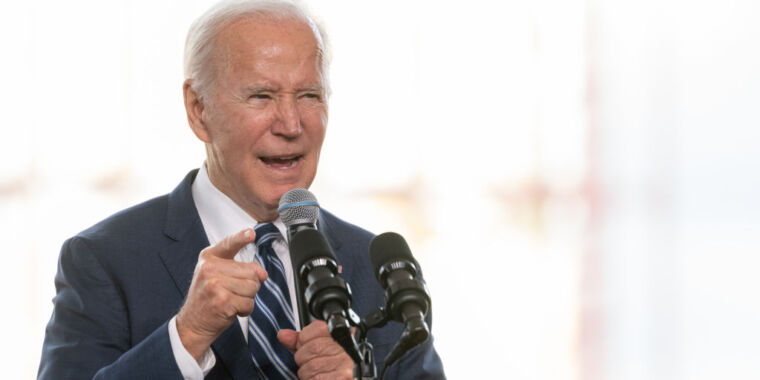
As president, Joe Biden has made it clear that he wants to lead the charge to change how Big Tech operates in the US. In a rare op-ed for the Wall Street Journal, Biden heavily criticized tech companies while outlining three broad areas of regulatory reform that he says that Congress should be considering this year. Only with bipartisan action, Biden said, can the US do more to protect data privacy, prevent anti-competitive behavior, and “fundamentally reform Section 230,” by reversing course and holding platforms accountable for third-party content.
Not everyone agrees with Biden’s vision of a better future for US tech innovation, however. Perhaps the most disagreement is over his proposed Section 230 reforms. Republicans seem keen to revise Section 230, not because they want to hold platforms liable for content, but because they want to prevent a suspected content moderation bias against right-leaning users. Meanwhile, some nonpartisan critics have advised against Section 230 reforms proposed by both Democrats and Republicans. Among them is the Electronic Frontier Foundation, a nonprofit that defends civil liberties online, which has long said that, as it stands now, Section 230 is “an essential legal pillar for online speech.”
“As it was originally written, Section 230 allows good-faith moderation by platforms without fear of taking on undue liability for their users’ posts,” EFF’s transition memo providing tech policy recommendations for Biden reads. “Altering the law to force the removal of so-called ‘disinformation,’ to demand the political neutrality of their decisions, or to broaden platform liability for already-unlawful content would have consequences that reach far beyond the intended targets.” The EFF did not immediately respond to Ars’ request for comment but warned in the memo that by weakening Section 230, Biden could trigger even more content removal, silence more users, and decrease overall functionality of the Internet.
Another critic not entirely sold by Biden’s approach is Adam Thierer, a senior fellow for R Street, a nonpartisan, nonprofit policy research group. He tweeted that Biden’s “hotly worded” op-ed was “basically a call for America to become more like Europe on tech policy, with comprehensive, top-down, highly repressive controls on the information sector and digital innovators. This is absolutely the wrong approach for the US.”
Thierer told Ars that “the problem with the European Union model of tech regulation is that it leaves very little breathing room for innovation to occur because entrepreneurs are preemptively smothered by layers of convoluted, time-consuming red tape. Innovators are basically treated as guilty until proven innocent in the EU,” which makes it harder for EU tech companies to dominate global markets.
Even bleaker, Biden’s seeming urge, Thierer said, to adopt the EU’s “disastrous model of top-down, heavy-handed technological governance” could inadvertently pave the way for China to continue growing an outsize influence in the tech sphere. That, Thierer said, would pose risks to America’s global competitive advantage and collective national security—which are risks that Biden seems keenly aware of due to the seemingly unstoppable popularity of TikTok.
Past failures of bipartisan bills cracking down on Big Tech
Biden said in his op-ed that US regulations need to change because “the risks Big Tech poses for ordinary Americans are clear.” He wants Congress to help him set clear limits on what data can be collected, establish controls to prevent abusive and illegal content from spreading, and outline “fairer rules of the road” to enable more online competition and innovation.
Suffocating US tech innovation is a possible outcome of passing any new law and, thus, a big concern for many lawmakers. Thierer told Ars that before passing any new federal laws, Biden should examine the patchwork of existing federal and state tech industry regulations to identify laws already impeding innovation. In EFF’s transition memo, EFF recommended that Biden review state laws to identify the strongest ones and not pass any federal laws that would preempt those state laws.
Last year, Congress’ attempts to pass bipartisan bills designed to hold Big Tech accountable failed, partly due to intense Big Tech lobbying, OpenSecrets reported. In his op-ed, Biden said his administration had spent the past two years working toward his vision to crack down on Big Tech, but the time has now come for Congress to resist the influence of lobbyists and get on board with his ideas for new regulations.
“Our existing authority has limits,” Biden wrote. “We need bipartisan action from Congress to hold Big Tech accountable.”
The president seems aware that he will have to face down critics. But ultimately, Biden seems to believe that he will garner enough support by appealing to “shared values” of all American lawmakers.
“There will be many policy issues we disagree on in the new Congress, but bipartisan proposals to protect our privacy and our children; to prevent discrimination, sexual exploitation, and cyberstalking; and to tackle anticompetitive conduct shouldn’t separate us,” Biden wrote. “Let’s unite behind our shared values and show the nation we can work together to get the job done.”







